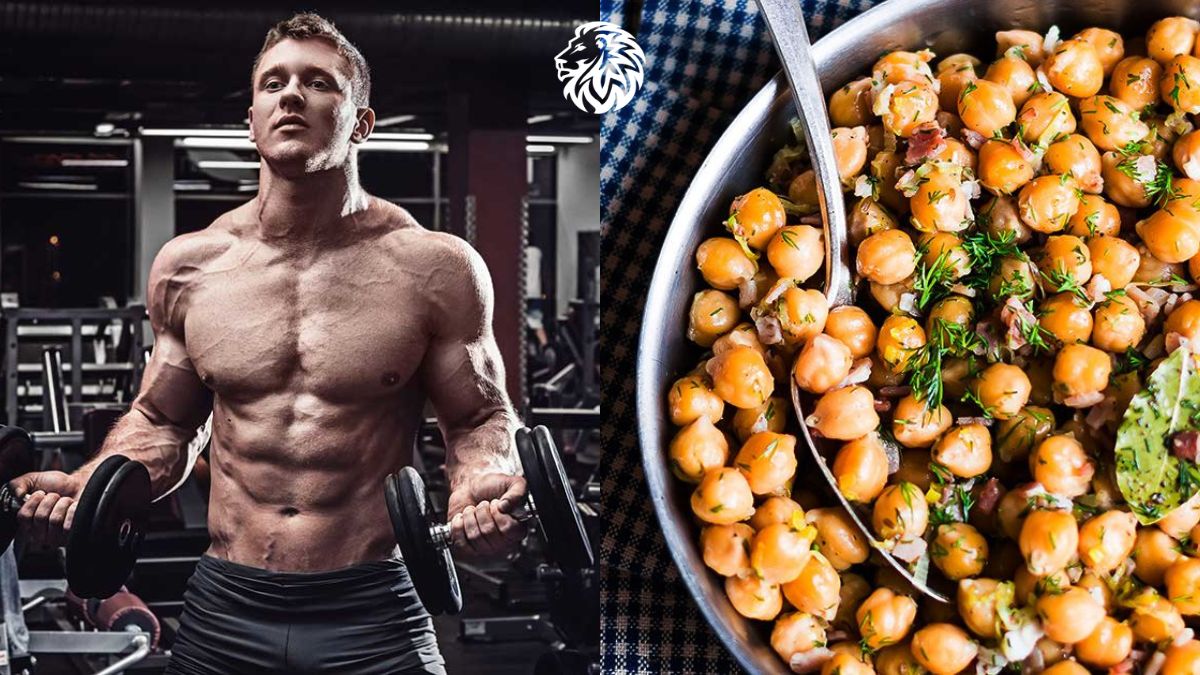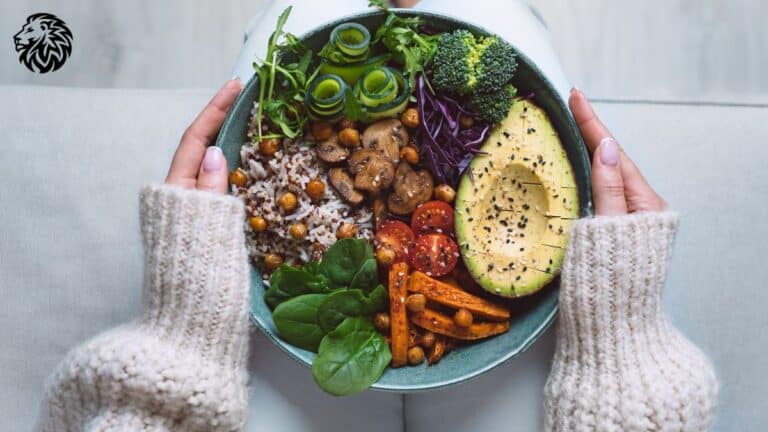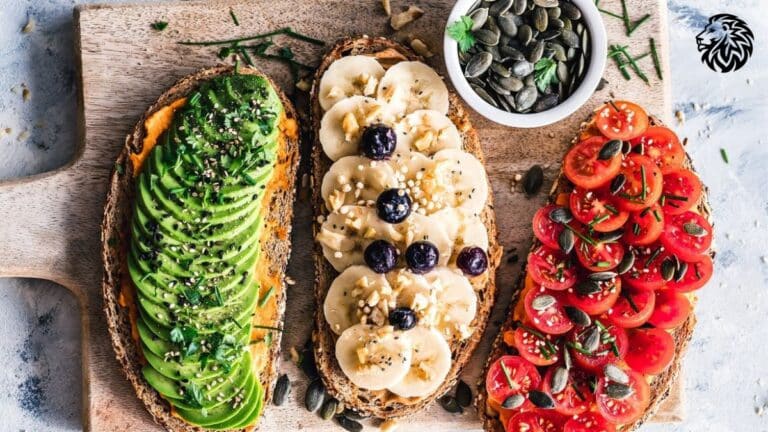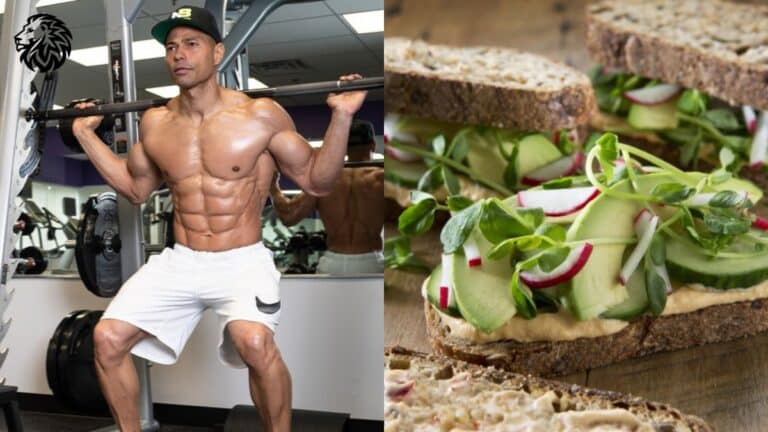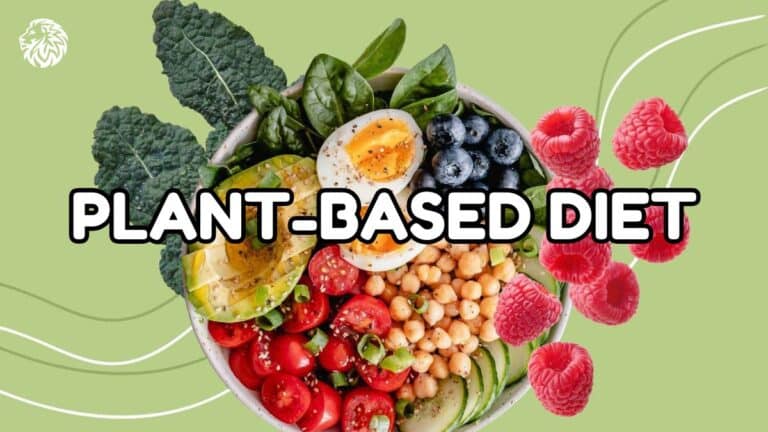The path to health, fitness, and well-being has many routes, one of which is increasingly being chosen – veganism. This lifestyle and food choice, saying no to all animal products and by-products, is gaining momentum. People are flocking towards it for reasons as diverse as the environment, ethical concerns, and of course, health. However, with the rise in veganism comes misconceptions and stereotypes, one being the supposed difficulty of building muscle on a vegan diet.
The idea that one cannot gain muscle mass while following a vegan diet is a common fallacy. This idea comes from the belief that plants lack enough protein for growing and repairing muscles. Many people believe that animal-derived proteins are the only “complete” sources, and without them, muscle gain is not achievable.
But our goal here is to take this myth, flip it upside down, and give you the scoop on how to pump up those muscles on a vegan diet. We’ll dig into protein’s role in muscle building, highlight protein-rich plant foods, exploring effective training tactics, and much more. Get ready to unlock some science-backed, practical advice to aid you in your muscle-building mission. Let’s dive right in and unveil how vegans too can be muscle-bound.
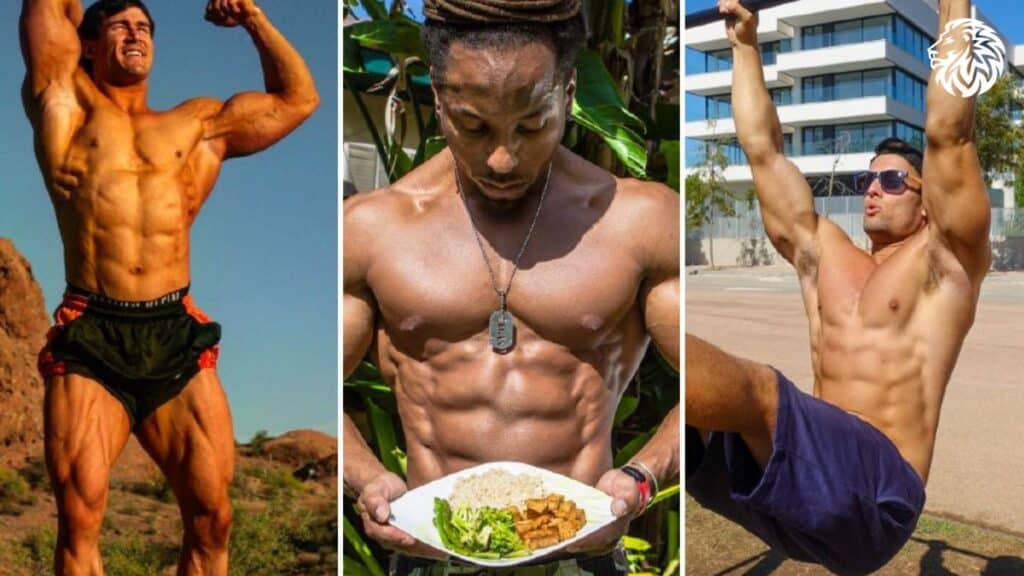
Understanding the Importance of Protein in Muscle Gain
Thinking about getting bigger muscles? A complicated molecule called protein holds most of the answer. Think of it as the star builder who carefully draws up the plans for building muscle tissue. When we work out, we cause small tears in our muscles that need to be fixed. This complicated dance between breaking down and fixing our muscles is called muscle protein synthesis. It makes our muscles stronger and bigger and helps them grow.
Role of Protein in Muscle Building and Recovery
When you look more closely at proteins, you’ll find a group of chemicals called amino acids. These are the “bricks” that make up life. There are 20 different amino acids that can combine into an infinite number of protein shapes. Now think about a hard session of lifting weights. It makes tiny cracks in our muscle fibers, and proteins, which are like tiny builders, do the important work of filling these cracks and making our muscles stronger. After a workout, your body needs more protein, which gives us the raw materials for this rebuilding story.
Explanation of Essential Amino Acids
Nine of these twenty amino acids are called “essential.” Our bodies can’t make them, so we have to eat them. Each of these necessary amino acids is very important for muscle repair and growth. Proteins that come from animals are called “complete” because they give us all of the necessary amino acids. But don’t think that all proteins from plants are “incomplete.” A balanced diet of plant proteins can meet your muscle’s needs, even if some lack crucial amino acids.
Busting the Myth: Veganism and Protein Deficiency
A common mistake is to think that a vegan diet doesn’t have enough protein to build muscle. Even though some plant foods might be low in certain important amino acids, a varied vegan diet can more than meet your protein needs for muscle growth. What’s the trick? Just eat a mix of beans, whole grains, nuts, seeds, and veggies throughout the day. A well-balanced vegan diet can boost muscle growth and performance and provide all important amino acids.
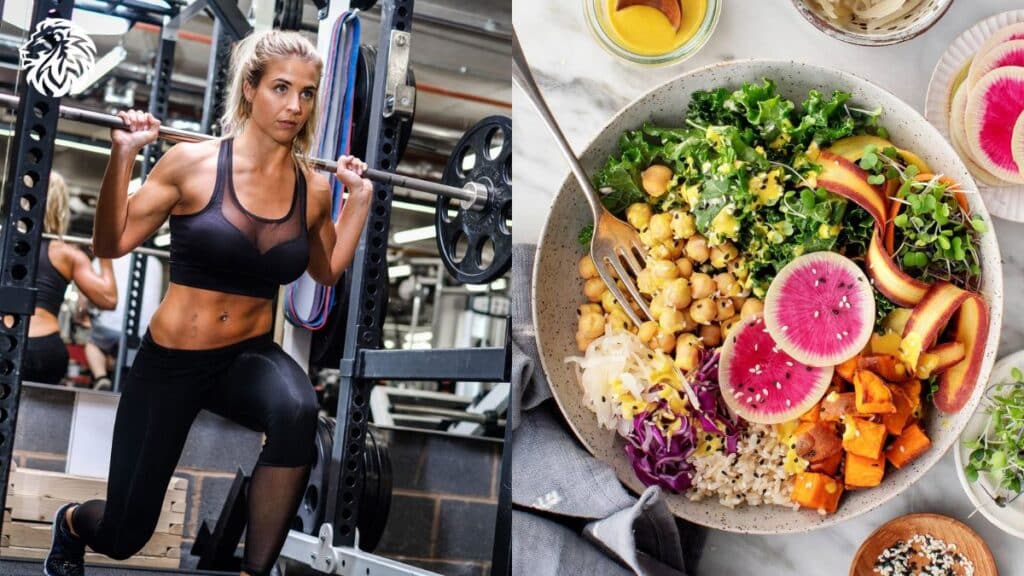
Identifying High-Protein Vegan Foods
Protein isn’t just found in meat and dairy—plants have plenty of it. A well-planned vegan meal with a lot of variety can easily meet your protein needs, which are important for muscle maintenance and growth.
List of Protein-Rich Plant-Based Foods
- Legumes: Lentils, chickpeas, black beans, and peas fall under this group, packed with a punch of protein, fiber, and other nutrients.
- Soy Products: Think tofu, tempeh, and edamame. These foods are ‘complete proteins’, encompassing all nine essential amino acids.
- Quinoa: This versatile grain adds another feather to the cap of ‘complete proteins’.
- Seitan: A creation from gluten, the predominant protein in wheat, seitan is a veritable protein treasure trove.
- Nuts and Seeds: Almonds, peanuts, chia seeds, flax seeds, and hemp seeds – each comes laden with protein.
- Whole Grains: Brown rice, oats, barley are protein contributors, while also providing complex carbohydrates.
- Green Veggies: Broccoli, spinach, and peas add a decent protein fraction to your plate.
How to Include These Foods in Your Daily Diet
It might be easier than you think to work these protein sources into your meals. A breakfast drink with spinach, chia seeds, and plant-based protein powder. A quinoa, veggie, and chickpea salad for lunch. A tofu or tempeh stir-fry dinner served on a bed of brown rice. Snacks? Think hummus and veggies, a handful of nuts, or a shake.
Emphasizing Variety for a Balanced Amino Acid Profile
Although some plant-based foods are replete with all essential proteins for muscle building, many others feature only a subset of essential amino acids. Hence, the secret sauce is to rotate your plant-based proteins throughout the day, ensuring a rich, complete profile of amino acids for muscle fortification and repair. And no, you need not consume all essential amino acids in the same meal. Your body will utilize them effectively as long as they’re part of your daily diet.
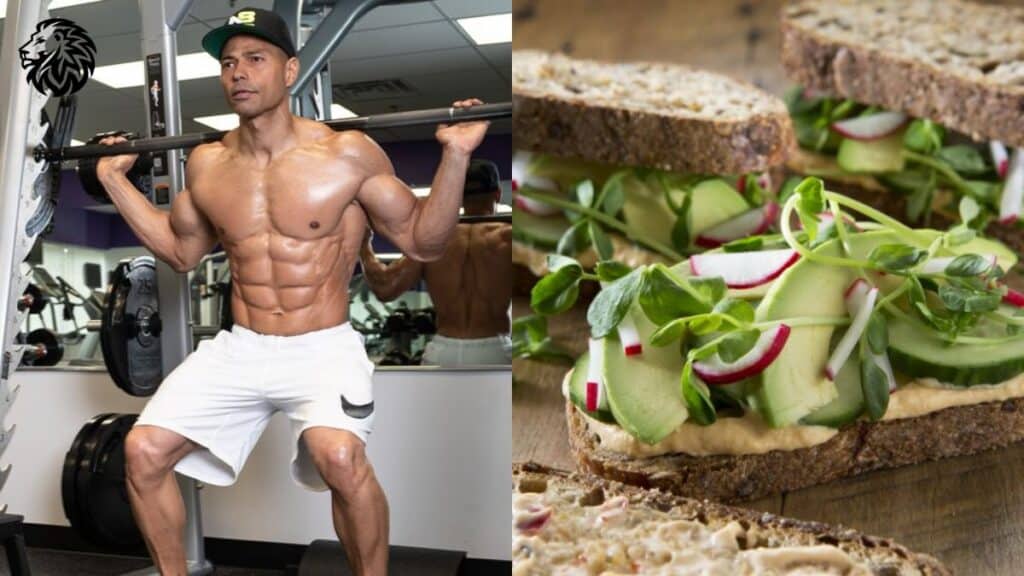
Proper Training for Muscle Gain
While nutrition is crucial for muscle gain, so is the right type of exercise. Resistance and strength training are fundamental for stimulating muscle growth.
Overview of Effective Resistance Training Exercises
Resistance training involves exercises that make your muscles work against a weight or force. Here are some effective exercises:
- Free Weights: Exercises such as squats, deadlifts, bench press, and lunges using dumbbells and/or barbells are great for muscle building.
- Bodyweight Exercises: Push-ups, pull-ups, squats, and lunges are examples of exercises that use your body weight for resistance.
- Resistance Bands: These can be used for a variety of exercises to provide resistance and promote muscle growth.
- Weight Machines: Gym machines can target specific muscle groups and are often easier for beginners.
Remember, consistency and proper form are crucial to get the best results and avoid injury.
Importance of Progressive Overload for Muscle Growth
Progressive overload is a method that involves gradually increasing the amount of stress placed upon the body during exercise over time. This can be achieved by increasing the weight, changing the exercises, varying the number of sets or reps, or decreasing rest time between sets. This continuous increase in demand helps to stimulate muscle growth by pushing the muscles beyond what they are accustomed to.
How to Incorporate Rest Days for Muscle Recovery
Rest is as important as the workout itself when it comes to muscle growth. Rest days allow your muscles to repair, recover, and grow stronger. It’s during this time that the body uses protein to repair the muscle fibers torn during exercise. Aim for at least two rest days per week and avoid working out the same muscle group on consecutive days. Remember, overtraining without adequate rest can lead to injuries and hinder your muscle-building progress.
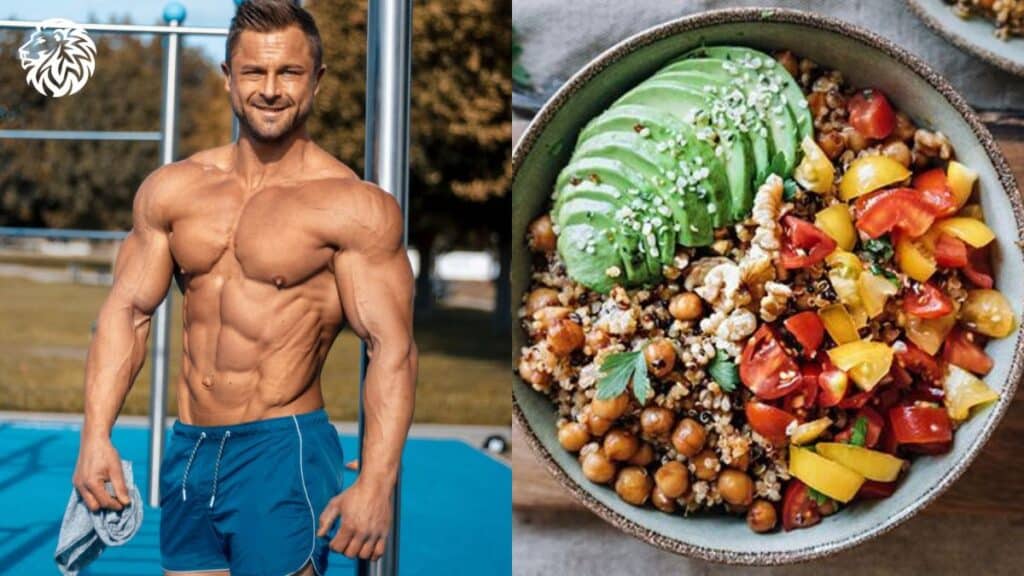
Role of Adequate Caloric Intake
When it comes to gaining muscle, consuming adequate calories is as important as your protein intake. This section will detail the role of caloric intake in muscle gain, provide sources of healthy vegan calories, and explain how to balance your macronutrients in a vegan diet.
Importance of Eating a Caloric Surplus for Muscle Gain
To build muscle, your body needs energy, and it gets that energy from the calories you eat. The process of building new muscle tissue requires more calories than your body uses for basic functions and daily activities. This is known as being in a caloric surplus. The degree of surplus will vary depending on your goals, activity level, and metabolic rate, but a common guideline is consuming an extra 250-500 calories per day more than your maintenance level.
Healthy Sources of Vegan Calories
For muscle gain, you need to eat more, but it’s important that this extra food comes from healthy sources. Let’s go on a tour of nutrient-dense veggie sources of calories:
- Nuts and Seeds: Laden with salubrious fats, proteins, and fiber, these calorie-dense nibbles brim with indispensable nutrients.
- Avocados: This verdant fruit offers a bountiful supply of healthful fats and calories, perfect for salads, smoothies, or as a delectable spread on whole-grain toast.
- Whole Grains: Complex carbohydrates, fiber, and protein abound in oats, brown rice, and quinoa, proffering sustained energy release and satiety.
- Legumes: With a protein and complex carbohydrate profile, beans, lentils, and chickpeas serve as superb calorie sources.
- Fruits: While their calorie content might pale in comparison to other items on this list, fruits, especially avocado, bananas, and dried variants, are replete with vitamins, minerals, and natural sugars for energy.
How to Balance Macronutrients (Carbs, Fats, and Protein) in a Vegan Diet
The right balance of macronutrients is the key to building muscle and staying healthy generally. Each macronutrient in your food serves a different purpose:
- Proteins are what hold muscles together and help them grow and heal.
- Carbohydrates are the power source for hard workouts and everyday tasks.
- Fats are important for making hormones and absorbing nutrients.
A normal breakdown of macronutrients for building muscle might be 40-30-30, but the best balance depends on each person’s needs, activity level, and metabolic health. A dietitian or nutritionist can modify a macronutrient distribution to an individual’s needs.
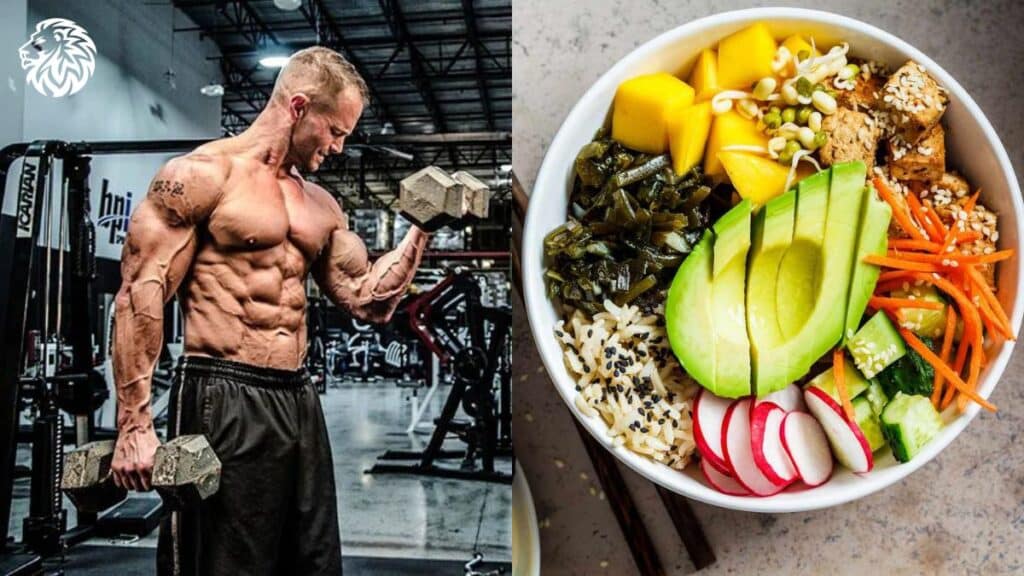
Importance of Nutrient Timing for Vegans
Nutrient timing refers to the strategic consumption of nutrients at specific times in relation to exercise. This concept can play a role in muscle recovery, growth, and overall performance.
Explanation of Nutrient Timing and Its Impact on Muscle Gain
The idea behind nutrient timing is to optimize the body’s response to exercise. Consuming the right nutrients before, during, and after a workout can enhance performance, speed up recovery, and stimulate muscle growth. While nutrient timing won’t make or break your results, it can provide an edge, especially for athletes or those involved in intensive training.
The Benefits of Consuming Protein Pre- and Post-Workout
Eating protein before a workout can provide your body with a steady supply of amino acids during your training session. This helps prevent muscle protein breakdown. Post-workout protein is essential for recovery and helps kick-start the muscle repair process.
Recommendations for Nutrient-Dense Vegan Meals and Snacks Around Workouts
- Pre-Workout: Aim for a meal or snack that includes both protein and complex carbs. This might be a smoothie made with a plant-based protein powder and a banana, or whole grain toast with almond butter.
- Post-Workout: Within the hour following your workout, consume a meal or snack abundant in protein and carbs. This could manifest as a quinoa bowl teeming with tofu and veggies or a smoothie blending plant-based protein powder, berries, and spinach.
Bear in mind that these are broad guidelines, and the most efficacious approach will align with your individual requirements, tastes, and objectives. Do not hesitate to experiment with various food items and timings to discern the most compatible routine for you.
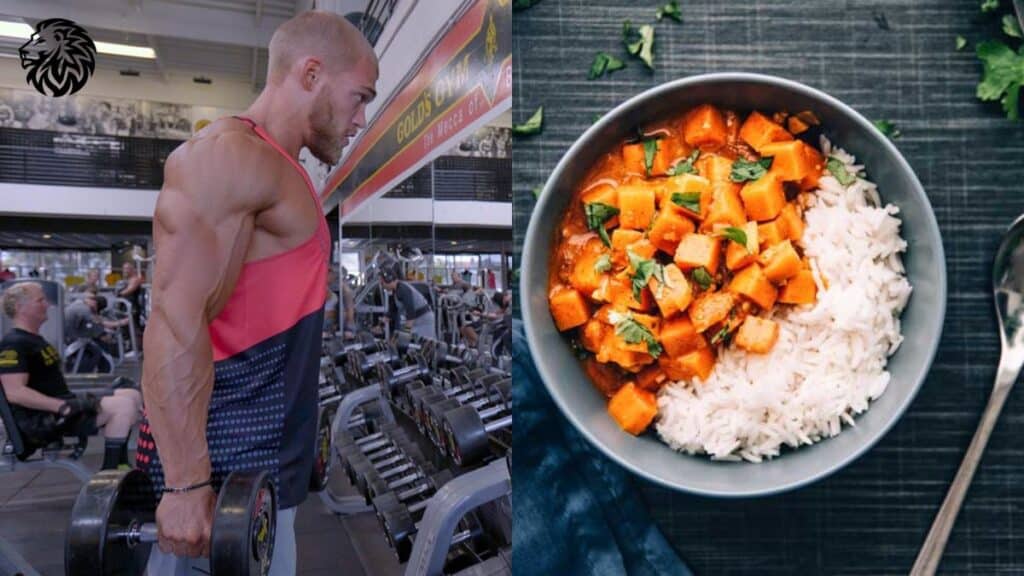
Supplements for Vegans
Although a balanced vegan diet can provide most of the nutrients your body craves, certain nutrients are harder to acquire solely from plant sources. Supplements can be a lifeline by making up for these nutritional gaps, helping you gain strength, and improving your health as a whole.
How to Use Supplements to Build Muscle on a Vegan Diet
- Vegan Protein Powders: If whole foods alone aren’t meeting your protein needs, a vegan protein powder can be a handy addition.
- Creatine: This compound amps up your muscles’ energy supply during heavy lifting or high-intensity workouts. Although typically found in animal foods, vegan athletes might benefit from a creatine supplement.
- Branched-Chain Amino Acids (BCAAs): Essential amino acids with a central role in muscle repair and growth. A supplement might be handy, particularly for vegans engaging in intensive training.
Importance of B12, Iron, Omega-3, and Other Essential Nutrients
- Vitamin B12: Important for brain function and making red blood cells, but it is hard to find in plants, so vegans almost have to take a supplement.
- Iron: Iron from plant-based sources is harder to absorb than iron from animal sources. Vegans might need to eat more iron-rich foods or think about taking a supplement.
- Fatty acids with omega-3: Omega-3s are important for the health of your heart and brain. You can find them in flaxseeds, chia seeds, and walnuts. But vegans might need a supplement made from algae to make sure they get enough.
Guidelines for Safe and Effective Supplement Use
Supplements can be very helpful, but you should use them wisely. Here are some safety guidelines:
- Consult a Healthcare Provider: Engage with a healthcare provider before embarking on a supplement journey to understand potential risks, benefits, and possible interactions with any medications.
- Adhere to Recommended Dosages: Supplements are to be used as directed by a healthcare provider or as indicated on the product label. More isn’t always better, and excess can sometimes cause harm.
- Remember the Primacy of Food: While supplements can fill nutritional gaps, they cannot substitute a balanced, varied diet. Aim for nutrient-dense whole plant foods, deploying supplements as a supporting act, not the lead player.
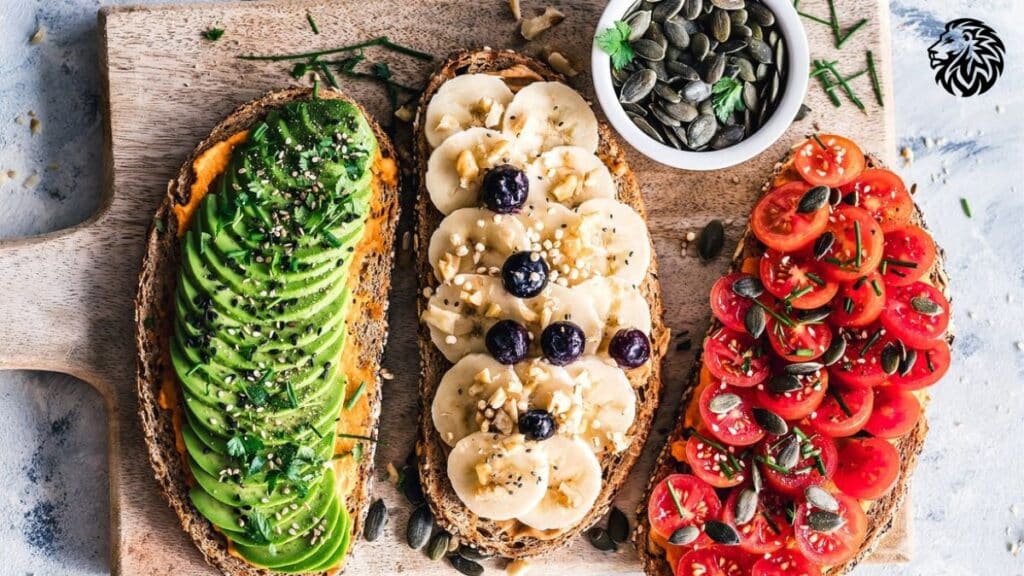
Conclusion
Building muscle as a vegan is entirely achievable and can be healthful and rewarding with the right approach. We’ve discussed the crucial role of protein and the importance of consuming a variety of plant-based proteins to meet essential amino acid needs. We’ve identified high-protein vegan foods and ways to include them in daily meals. The importance of resistance training, progressive overload, and rest for muscle growth has been highlighted. The role of sufficient caloric intake and nutrient timing in promoting muscle gain was outlined. Finally, the use of supplements to complement a balanced vegan diet was discussed.
As with any diet plan, the key is to find what works best for you! This might mean experimenting with different types of exercises, trying out various high-protein vegan foods, adjusting meal timing, or incorporating supplements. Listen to your body and adjust your approach based on your energy levels, performance, and progress towards your muscle-building goals.
With a well-planned diet and a consistent exercise regimen, building muscle on a vegan diet can offer numerous health benefits. By choosing a diverse range of whole, plant-based foods and following strategic training principles, you can build muscle, improve athletic performance, and promote overall health – all while adhering to a vegan lifestyle.
